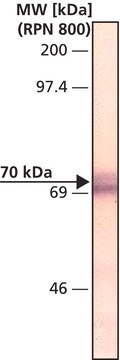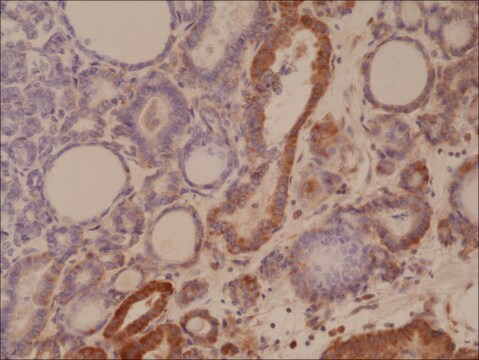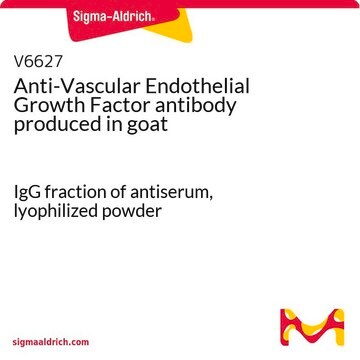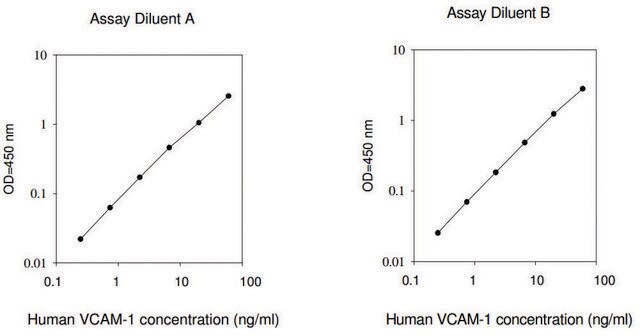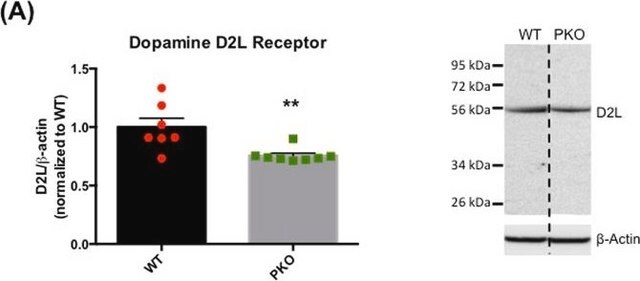V9134
Monoclonal Anti-Vascular Endothelial Growth Factor Receptor-2 antibody produced in mouse
clone KDR-1, ascites fluid
Sinonimo/i:
Anti-KDR, Anti-VEGF R-2
Autenticatiper visualizzare i prezzi riservati alla tua organizzazione & contrattuali
About This Item
Prodotti consigliati
Origine biologica
mouse
Coniugato
unconjugated
Forma dell’anticorpo
ascites fluid
Tipo di anticorpo
primary antibodies
Clone
KDR-1, monoclonal
contiene
15 mM sodium azide
Reattività contro le specie
human
tecniche
immunohistochemistry (frozen sections): 1:800 using human placenta
indirect ELISA: suitable
Isotipo
IgG1
N° accesso UniProt
Condizioni di spedizione
dry ice
Temperatura di conservazione
−20°C
modifica post-traduzionali bersaglio
unmodified
Informazioni sul gene
human ... KDR(3791)
Descrizione generale
Monoclonal Anti-Vascular Endothelial Growth Factor Receptor-2 (mouse IgG1 isotype) is derived from the KDR-1 hybridoma produced by the fusion of mouse myeloma cells and splenocytes from an immunized mouse. Vascular endothelial growth factor (VEGF), is a homodimeric heparin-binding glycoprotein. It is a member of a family of endothelial cell mitogenic and angiogenic factors. The VEGFR2 gene has been mapped to human chromosome 4q11-q12, which is the same locus for PDGF receptor and c-kit.
The antibody reacts specifically with VEGF receptor 2 (KDR) and does not recognize VEGF receptor-1 (Flt1 receptor), VEGF receptor 3 (sFlt4), and PDGF-Rβ.
Immunogeno
recombinant human extracellular domain of VEGFR-2 (KDR).
Applicazioni
Monoclonal Anti-Vascular Endothelial Growth Factor Receptor-2 antibody produced in mouse has been used in:
- immunohistochemistry
- histology
- immunostaining
- enzyme linked immunosorbent assay (ELISA)
Monoclonal Anti-Vascular Endothelial Growth Factor Receptor-2 antibody produced in mouse was used for FACS analysis of HUVECs.
Azioni biochim/fisiol
Vascular endothelial growth factor (VEGF) specifically stimulates the proliferation of endothelial cells isolated from both small and large vessels. These include endothelial cells from adrenal cortex, cerebral cortex, fetal and adult aorta and human umbilical vein.
Vascular endothelial growth factors receptors (VEGF Rs) are receptor tyrosine kinases that bind to VEGF. VEGF plays an important role in embryonic vasculogenesis, angiogenesis and homeostasis. The binding of VEGF to VEGF R2 results in activation of MAPK, PI3K, PKC, FAK and Src kinase pathways. The biological roles of VEGF R2 include in epithelial cell growth, proliferation, survival, migration, vascular permeability and angiogenesis.
Esclusione di responsabilità
Unless otherwise stated in our catalog or other company documentation accompanying the product(s), our products are intended for research use only and are not to be used for any other purpose, which includes but is not limited to, unauthorized commercial uses, in vitro diagnostic uses, ex vivo or in vivo therapeutic uses or any type of consumption or application to humans or animals.
Non trovi il prodotto giusto?
Prova il nostro Motore di ricerca dei prodotti.
Codice della classe di stoccaggio
10 - Combustible liquids
Classe di pericolosità dell'acqua (WGK)
WGK 1
Punto d’infiammabilità (°F)
Not applicable
Punto d’infiammabilità (°C)
Not applicable
Scegli una delle versioni più recenti:
Possiedi già questo prodotto?
I documenti relativi ai prodotti acquistati recentemente sono disponibili nell’Archivio dei documenti.
Vascular endothelial growth factor (VEGF) is an autocrine growth factor for VEGF receptor-positive human tumors
Masood R, et al.
Blood, 98(6), 1904-1913 (2001)
Axitinib affects cell viability and migration of a primary foetal lung adenocarcinoma culture
Menna C, et al.
Cancer Investigation, 32(1), 13-21 (2014)
Neuropilin-1 promotes VEGFR-2 trafficking through Rab11 vesicles thereby specifying signal output
Ballmer-Hofer K, et al.
Blood, 118(3), 816-826 (2011)
Chie-Pein Chen et al.
Stem cells (Dayton, Ohio), 26(2), 550-561 (2007-11-03)
Maternal cells can become engrafted in various fetal organs during pregnancy. The nature of the cells and the mechanisms of maternofetal cell trafficking are not clear. We demonstrate that human lineage-negative, CD34-negative (Lin(-)CD34(-)) multipotent mesenchymal stromal cells express alpha(2), alpha(4)
Markus Meissner et al.
Circulation research, 94(3), 324-332 (2003-12-20)
Peroxisome proliferator-activated receptors (PPARs) are ligand-activated transcription factors, originally implicated in the regulation of lipid and glucose homeostasis. In addition, natural and synthetic PPAR activators may control inflammatory processes by inhibition of distinct proinflammatory genes. As signaling via the vascular
Il team dei nostri ricercatori vanta grande esperienza in tutte le aree della ricerca quali Life Science, scienza dei materiali, sintesi chimica, cromatografia, discipline analitiche, ecc..
Contatta l'Assistenza Tecnica.